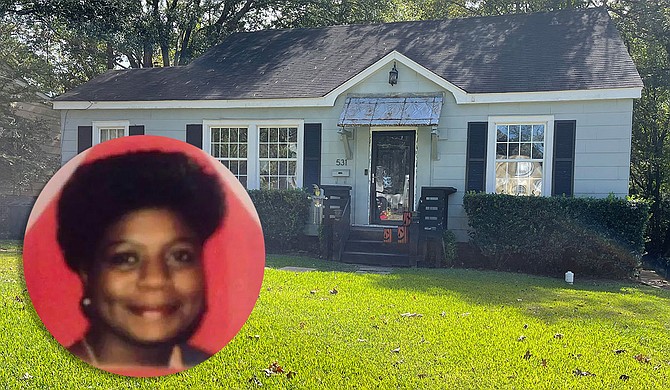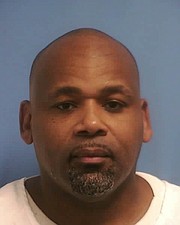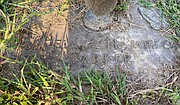Early on Monday, July 21, 1997, an assailant stabbed 36-year-old Angela Parker (insert) six times in her apartment (pictured) at 531 Hartfield St. in Jackson, Miss. Photo by Kayode Crown / Mississippi Free Press
JACKSON, Miss.—Blood was all over the place. Early on Monday, July 21, 1997, an assailant stabbed 36-year-old Angela Parker six times in her apartment at 531 Hartfield St. in Jackson. The attacker choked and beat the Kentucky Fried Chicken cook who also worked at Von Schrader General Maintenance to support her three children.
Then-Jackson Police Department spokesman and now-Hinds County District 1 Supervisor Robert Graham announced that the onslaught took place at 4 a.m. The deputy coroner at the time, Bill Chancellor, said that Parker died from blood loss as a result of stab wounds to the chest and back. Police never found a murder weapon.
Parker’s ex-husband, Daron Parker, said he picked up the three children—Darolyn, 12, DeShean, 8, and Deven, 6—Sunday night, five hours before the Monday morning attack, though it was common for him to pick them up on Mondays.
The Clarion-Ledger’s Thyrie Bland reported on Wednesday, July 23, 1997, that Jackson Police Department Homicide Detective Sergeant Gwen Nicks described the case as “baffling,” saying, “We are still trying to make sense of this.”
An Arrest
In eight days, JPD said it had made sense of the case, announcing an arrest.
On the evening of Tuesday, July 29, 1997, eight days after the murder, Jackson Police Department Homicide Detectives Reggie McCann and John S. Williams went to G & O Manufacturing Company at 1420 W. Ridgeway St. in Jackson where they arrested 26-year-old Ronnie Johnson as a suspect in Parker’s murder.
McCann, a white man who joined the Jackson Police department in 1977, died on Oct. 20, 2013, at age 70. Williams graduated from Lanier High School in 1976 and joined the Army for three years before embarking on a law-enforcement career in the Jackson Police Department, first as a detention officer between 1984 and 1985, then as a precinct 4 patrol officer from 1985 until his promotion to homicide detective in 1996. He is now with the Mississippi Capitol Police.
Johnson’s trial took place in June 1998, and the jury found him guilty of murdering Parker. Then-Hinds County Circuit Court Judge L. Breland Hilburn sentenced him to life imprisonment. Hilburn died on April 5, 2021 at age 79 from COVID-19.
Johnson has, however, maintained that he is innocent and accused the detectives of hiding the video evidence that placed him three miles away at Blue Chip Lounge on Bailey Avenue at the time of the murder.
The police said some items including furniture were missing from Parker’s house at the time of her murder. The detectives said they got an anonymous tip that the missing items were in Johnson’s 328 Magnolia St. apartment, establishing his potential connection to the murder.
Johnson provided detectives the receipts for the furniture, which showed that he paid $350 for it three days after Parker’s murder and had nothing to do with her death. Still, that physical evidence was not enough to get him off the hook.
‘They Took Witnesses’ Statements, and They Withheld It’
Born in Jackson on Oct. 26, 1970, Johnson is now 51 years old and has served 24 years in the Mississippi Department of Corrections custody with ID number R5181. He is now at the Mississippi State Penitentiary in Parchman.
“I do have the evidence,” he told the Mississippi Free Press in a call from Parchman on Oct. 6, 2021. “I do have the evidence of the Jackson Police Department, where they withheld evidence that was favorable to me.”
“They took witnesses’ statements, and they withheld it,” he added. “They didn’t give it to my defense attorney. But I didn’t know anything about it during trial until after the trial.”
He said that his cousin David Smith, who is 10 years older and died of congestive heart failure some years back, found the evidence when he was a paralegal intern at the Jackson Police Department investigation unit, a position he held until around 2006.
“He was studying old cases and stuff like that. He looked into my case, and he found a file that says ‘detectives’ notes,’” Johnson said. “And within those detectives’ notes, he found all those witnesses (who attested) that I didn’t have anything to do with the murder, that I was at the club.”
The Mississippi Free Press has obtained the documents that the prisoner claims should have left him off the judicial hook, one of which was dated Aug. 22, 1997, nine months before the trial and one month after his arrest. The evidence showed that the homicide detectives interviewed Blue Chip Lounge owner John Ware, and he provided them the surveillance video recording that apparently placed Johnson at the club at the time of the murder. Ware, in the detective notes, informed them that he was willing to testify in the case.
“On 8/21/97, Detectives Williams and McCann went to the Blue Chip Lounge on Bailey Ave., and John Ware signed a release form to hand over 1 (one) security tape,” the document read. “He presented detectives with a VHS cassette with video footage of the front door and parking lot of the Blue Chip Lounge.”
“This tape showed that the suspect Ronnie Johnson entered the lounge at approx. 3:05 am and exited the lounge at approx. 5:10 a.m. on Monday, 7/21/97,” it continued. “Ware was also asked by detectives to review his other security tapes, which he willingly allowed detectives to view.”
“Detectives asked Ware if he was willing to be a witness if called,” the document added. “He said that he would testify that suspect Johnson was at his establishment as shown on the security tape.”
The Jackson Police Department has an evidence log sheet, indicating that John Ware provided a statement and that Detective McCann got one security tape from him. The name on the log showed that the person who logged the evidence into the possession of the Jackson Police Department was Michelle Smith, who entered the information at 4:38 p.m. on Aug. 22, 1997. “Evidence recovered by Det. R. McCann -391,” the log sheet indicated. It also stated that he obtained the evidence on Aug. 21, 1997, and that the case number is 97-143581.
This reporter spoke with Williams on Wednesday, Oct. 27, 2021, on the phone about Johnson’s claim that he and McCann hid video evidence from Johnson’s defense team that should have cleared him of Parker’s murder. “My comment is, you need to talk to JPD, have a good day man, don’t call me with this, bye,” Williams said and hung up.
In an affidavit that Ware later signed on Jan. 23, 2008, that bears Holmes County Sheriff Willie March’s notary-public attestation, Ware said that the detectives had told him that providing the VHS tape of the surveillance video will help Johnson in the case. March is still the sheriff of Holmes County with notary-public ID 008250.
“I (am) John Ware, owner of the Blue Chip Lounge, in Jackson, MS,” Ware wrote in the affidavit. “I viewed my security tapes and the recording of the night and early morning of July 21st, 1997.”
“I saw Ronnie Johnson enter the lounge at about 3:00 a.m. and the security tape clearly shows that Johnson did not leave the lounge until 5:09 a.m,” he added. “On exiting the lounge, Johnson stopped to help my nephew Willie Holmes to start his car.”
“I spoke with a Detective Williams concerning the tapes back in August 1997, and I turned the tape over to Detective Williams of the Jackson Police Department, and to this day, I haven’t seen the tape again.”
The Parchman inmate told the Mississippi Free Press that he does not know who John Ware is, nor could he say whether he was a white or Black man. On three visits to the Blue Chip Lounge—on Saturday, Oct. 9, Sunday, Oct. 17, and Tuesday, Oct. 26—this reporter did not meet the club owner and could not confirm if the ownership has changed hands. The club is, however, still in operation.
“They said it would clear Mr. Johnson, but the video was never used, (and) Mr. Johnson was convicted of murder,” Ware concluded in the affidavit.
Johnson recalled helping Holmes in the early morning of Monday, July 21, 1997, with his car. “I got to the club about 3:05 a.m. in the morning, and they close around five in the morning,” he told the Mississippi Free Press. “When I left, I was walking outside the club, and then Willie Holmes had a problem with his car. I offered to help him, and I pushed his car off, got his car running, and I left, and that was my night.”
On May 12, 2004, Holmes made a statement in an affidavit confirming that Johnson helped him that morning seven years before to get his car started. One person by the name of Stacey, a notary public, attested to the statement. The last name is unclear on the document. The stamp on it reads: “Notary Public State of Mississippi At Large My Commission; Expires: January 21, 2005; Bonded thru Heiden Brooks & Garland, Inc.”
“On the 21st of July, 1997, I, Willie James Holmes, witnessed Ronnie Johnson (present) in and outside of the Blue Chip Lounge on Bailey Ave. in Jackson, Mississippi,” he wrote. “Mr. Johnson entered the lounge between 3:00 a.m.- 3:15 a.m. and Johnson was not accompanied by anyone.”
Holmes said Johnson sat at a table with two women friends, played pool, drank a few beers and socialized with some people there.
“Then about 4:15 a.m., I was leaving the lounge, Mr. Johnson was exiting the lounge also,” Holmes continued. “Johnson stood on the outside of the lounge talking with a few females, and just at that time, I was having trouble with my car, and Johnson approached me and asked me if I needed any help.”
“I said yes, and Johnson helped me to get my car started, and I offered him some money for helping me, but he refused,” he added. “Johnson then got in his truck and drove away.”
“At that time, it was clearly after 5:00 a.m. on July 21, 1997. So, Ronnie Johnson was there at the Blue Chip Lounge for at least 2 hours in my presence, and this I will testify to.”
Then-Hinds County assistant Public Defender André de Gruy defended Johnson during the 1998 trial. He is now the Mississippi Public Defender. He told the Mississippi Free Press on Monday, Oct. 18, 2021, that he was never aware of a video recording of Johnson the morning of the murder and that he was hearing of it for the first time during the call.
“This is the first I’ve heard of JPD having a video of him at a nightclub,” Gruy said. “You know, if they have that, they certainly didn’t give it to us.”
“I don’t know why they wouldn’t have dismissed the case with that kind of evidence in their file.”
When summarizing the case as he recalled it, De Gruy said: “Ronnie was friends with the lady who was killed. He was charged with capital murder and then got reduced down to murder because there wasn’t evidence to support the underlying felony (burglary). He went ahead on trial on the murder, and he was convicted.”
How Johnson Met Angela Parker
Johnson attended Brown Elementary School, which the Jackson Public School District closed in 2018. Before graduating from Wingfield High School, he went to Rowan Junior High School in Jackson, which closed in 2017.
He joined the Marine Corps in 1988 for five years before enrolling at then-Hinds Junior College to pursue a career in physical therapy, although he did not complete his degree. He instead started a private business that he named Johnson Landscaping and Janitorial Services, serving the area in a maroon-colored GMC truck, with the business’ name inscribed on the body.
Johnson, usually working outside when completing clients’ requests, said that he met Parker through his private business and that he never entered her home, as she paid him in front of the house.
He worked the 4 p.m.-to-midnight shift at G & O Manufacturing at the time of the incident. When he left after midnight on Monday, July 21, 1997, he said that Parker called him and asked if he could come around to collect the $75 she owed him for his service. She told him she had a friend, Connie Martin, with her. Martin recorded what she remembered from that night in a Jan. 23, 2008, affidavit that Holmes County Sheriff March stamped.
(Editor’s note: We have redacted portions of the statement because of the sensitivity of the matter.)
“I, Connie Martin, a close friend of Angela Parker, was at the home of Angela Parker on the morning of July 21st, 1997,” Martins wrote. “I witnessed Angela and Ronnie Johnson sitting on the front steps of Angela’s home.”
“Angela and Johnson talked until 2:20 a.m.,” she added. “I came to the door and told Angela she had a phone call; it was [redacted].”
“She came in the house and argued with [redacted] for about 5 minutes until she hung the phone up and went back outside; Johnson left about 2:45 a.m.”
Martin recalled that Parker then came back into the house and told her that [redacted] was coming over.
“As I was leaving for the airport to return to Chicago, [redacted] was pulling in the driveway,” she said. “I left Angela safe and sound, [redacted] threatened me a month ago if I help Johnson, but boldly I state that Johnson is innocent of murder.”
Williams Questioned Parker’s Neighbor, Jerry Coleman
Documents that Johnson’s cousin David Smith obtained from the Jackson Police Department’s investigation division included statements from Parker’s neighbors—Jerry Coleman and Ashley Strickland—on what happened the night of her murder.
The detectives’ notes showed that Detective Williams interviewed Coleman on Aug. 15, 1997. Detective McCann interviewed Strickland on Aug. 20, 1997. Coleman confirmed what Martin said about Johnson leaving Parker’s house and Parker going into the house after 2 a.m. on July 21, 1997.
Coleman said that he lived across the street from Parker, about 40 yards away, and was outside at that time of the night because his wife had recently given birth and consequently said he should not smoke inside the house. He also said he witnessed Martin leaving the house and two vehicles pulling up at the same time.
When Williams asked Coleman, “Do you know anything about the night Angela was killed?” Coleman answered, “On that night, I was standing out in my driveway, which is across the street from Angela’s, and I saw this guy (named) Ronnie.”
“Ronnie who?” the detective asked.
“I don’t know his last name, but he (was) out (in) front of Angela’s house talking to her, when her friend Connie came to the door, and Angela went in the house,” he said. “And about 15 minutes later, she returned and then started talking to Ronnie again.”
Coleman added that Johnson was wearing “some black shorts and a white Bulls T-shirt, and white tennis shoes.”
After Coleman told Williams that the time was about 2:25 a.m, he said that Johnson and Parker “talked for a few more minutes and Ronnie got in his truck and drove away.” He said that Parker then “went back in the house.”
“Did you see anyone else leave or enter the house?” Williams continued.
“I saw Angela’s friend Connie come out of the house and get in her car and pull away, but as she was leaving, a maroon car (pulled) in the driveway and a red SUV (parked) in front of the house,” Coleman answered.
“Do you know who was in the car and the SUV?” Williams asked.
“[Redacted] was in his car, and two other dudes got out of the SUV. I didn’t know them,” the neighbor answered. Coleman said that the three people went into the house. He added that after that, he finished smoking his cigar and making calls and went to bed.
“I’m going to show you some photos, and I would like to know if you’d ever seen this T-shirt before?” Williams then asked. Coleman replied that “Angela wears a T-shirt like that all the time.”
“Mr. Coleman, is there anything else you can tell us today about this case? ” the detective said.
“Yea, I believe [redacted] had something to do with Angela’s murder,” Coleman answered.
Detective McCann Interviewed Parker’s Neighbor, Ashley Strickland
McCann’s questioning of Strickland on August 20, 1997, which was recorded and typed, shed light on the question of what happened to Parker’s furniture.
Strickland said that she was standing in her kitchen washing dishes between 2:30 a.m. and 3:30 a.m. on the morning of July 21, 1997.
When she looked outside the window, she saw three men carrying furniture out of Parker’s house and loading it all up in a red SUV, and “Angela and redacted cussing and fussing at each other.”
She said that Parker and [redacted] were still arguing when the two men drove away with the furniture taken from the house and that [redacted] “slapped Angela and pulled her back into the house.”
Strickland said that she did not call the police when he witnessed the violence “because they fight all the time, and I don’t think anything of it, but when I woke up and found out that she was dead, I felt bad and scared because I could (have) called police.”
McCann followed that line of questioning by showing her “some pictures” and saying she should tell him if she recognized a particular T-shirt. Strickland said she does.
“Be advised that the witness has identified the gray T-shirt that was found behind the victim’s washing machine; where have you seen this T-shirt in this picture?” Williams asked.
“It’s just like the one Angela was wearing the night she was killed,” Strickland said. She said she was “very sure because she wears this shirt all the time.”
The Missing Furniture
The capital murder indictment that preceded Johnson’s trial accused him of “unlawfully and feloniously” murdering Parker, as he “engaged in the commission of the crime of burglary” by “breaking and entering the dwelling-house of Angela Parker” to rob her of personal property.
The Clarion-Ledger’s Jill Farrell King reported on Sept. 3, 1997, during the pretrial hearing that then-Hinds County Public Defender Tom Fortner argued that the police lacked enough evidence to charge Johnson with capital murder, which requires proving that the murder happened during the commission of a felony. Fortner was Hinds County Public Defender from 1991 to 2005.
Hinds County Court Judge Houston Patton, nevertheless, said the case could continue, regardless. Patton died on Jan. 12, 2020, at 84.
Johnson told the Mississippi Free Press that there is no evidence that he broke into the house as the prosecution claimed. He said he was looking for furniture for the Magnolia Street apartment he had just moved into and asked someone called Chris Daniels to help him get it. Daniels subsequently gave him a phone number, which Johnson said he later called.
“I just said, ‘Hey man, I will like to buy your furniture,'” Johnson recalled from the phone conversation. “And he said, ‘If I get custody of it, I’ll let you know.'”
“So Angela was killed on the 21st, then on the 24th three days later, they came to me,” Johnson said in a phone call to the Mississippi Free Press. “They called me at night when I got off work and said, ‘Hey man, I got that furniture for you; where are you?’ I said, ‘Men I am at the apartment,’ and I said, ‘Chris, you know where the apartment is, come on by.'”
“About 20 minutes later, I’m sitting out front on the back of my truck when they drove up,” Johnson added. “I looked at the furniture; all the furniture was wrapped up. Everything was clean and neat and tied up.”
He paid $350 cash for the furniture and $75 for a stereo, produced a prototype receipt, filled it, and Daniels signed it. On the day the detectives arrested Johnson, they got his receipts, with detectives McCann and Williams signing on the copy. The detectives dated their possession of it for the day of the arrest—July 29, 1997. They wrote the case number on the document—97-143581 and that they received it at 7:58 p.m.
Cicely Dorothea Davis’ Statement to the Police
Cicely Dorothea Davis shared the Magnolia Street apartment with Johnson at that time. Following the anonymous call about items “missing” from Parker’s house, the police searched Johnson’s apartment.
According to McCann’s note, Davis provided a typed statement on the day of Johnson’s arrest—July 29, 1997. She told the detectives that she and Johnson had moved into the Magnolia Street apartment only three weeks prior.
“When detectives served a search warrant on her apartment, the only furniture in the apartment which did not belong to Angela Parker was a tv, a dining room table, and two chairs,” McCann wrote in the report dated Aug. 3, 1997, while reporting about Davis. McCann characterized the items as “merchandise stolen from the residence of Angela Parker.” The sheet had the case number—97-143581—on it.
“In her statement, Davis said that on Thursday, 7/24/97, Ronnie came in the apartment and propped the door open,” McCann wrote. “He then started bringing items into the apartment.”
“These items included a Fisher component stereo in a component stand, and it had two large speakers. He brought in a large quantity of Compact Discs and cassette tapes with the stereo, which contained dual cassette decks, a (CD) player (it is not clear what this is), and an AM/FM stereo. Johnson then brought in two wood-end tables and a wood-coffee table,” McCann wrote.
Johnson, however, believes this shows that he did not steal from Parker but that two people brought the furniture to his house three days after her murder.
Witness at Johnson’s Apartment Complex?
In addition to Martins and Ware, Demetrius Tell supplied an affidavit via Holmes County Sheriff March supporting Johnson’s innocence claim. He stated that he witnessed two people bringing the furniture to Johnson’s apartment three days after Parker’s murder.
“On July 24th, 1997, I, Demetrius Tell was (with) Ronnie Johnson when he purchased a stereo, a wall fan, 2 (lamps), 2 end tables and other items from my friend Mayo Perry (aka) Chris Daniels and another man I didn’t know until (the) police told me he was [redacted],” Tell stated on Jan. 23, 2008. “I lived in the same apartment complex as Johnson, and I witnessed Johnson receive the furniture from the two men. It was 3 days after the murder (Thursday) 3 days after the murder.”
“On this day I swear that [redacted] and Mayo Perry (aka) Chris Daniels sold Ronnie Johnson the furniture in question,” he added.
A T-Shirt of Concern
As noted earlier, in statements to the police, Parker’s neighbors Strickland and Coleman said that a T-shirt of concern, found bloodied and behind the washing machine in Parker’s house, belonged to Parker. However, during the trial in June 1998, James Martin, Johnson’s childhood friend, said it was Johnson’s, The Clarion-Ledger’s Pamela Berry reported on June 3, 1998. The next day, two of Johnson’s former girlfriends—Tralunioca Rogers and Arrie Rhodes—also said the shirt belonged to Johnson.
Johnson denied that the shirt belonged to him in his interview with the Mississippi Free Press. He said that all those who testified to the contrary are lying.
“I’ve never seen that shirt before because my lawyer came to me; he said, ‘Do you own a Harley Davidson T-shirt?'” Johnson told the Mississippi Free Press. “I said, no. I said, ‘What you need to do is go look at the closet of my house and see what type of T-shirts that I own.’”
“I couldn’t even fit the T-shirt,” he added. “I think they said it’s a large T-shirt. I said, ‘No, I wear extra-large—2X T-shirt,”
“They never brought up the (T-shirt) size in the trial. I’ve never worn that T-shirt in my life, but they said there was blood on it, but the witnesses that the police interviewed said that Angela had a T-shirt like that.”
“It was all lies,” he contested. “I never had anything to do with the woman’s murder, and they knew that.”
Johnson disputes several portions of the testimony against him.
Witnesses at the trial said he sometimes goes by “Chris.” They said that, while in detention, he sent letters to them asking them to manufacture an alibi for him. They said he tried to implicate [redacted] in the crime and lied when he first told detectives on the day of his arrest that he did not know who Angela Parker was.
Johnson told the Mississippi Free Press that he called Parker “Ann” because he did not know her full name and only recognized her when detectives showed him her picture. He said detectives had free rein to twist what he said to them because they never recorded his statement and that he did not sign any.
On June 4, 1998, Berry reported that the trial proceedings showed that the prosecution’s case against Johnson was “largely circumstantial.“
Public Defender De Gruy said that evidence withheld in Johnson’s case is grounds for a new trial. “He certainly deserves a new trial, at least,” he told the Mississippi Free Press. “I mean, that’s an egregious Brady violation that they had evidence that exonerated him that they didn’t turn over.”
This story originally appeared in the Mississippi Free Press. The Mississippi Free Press is a statewide nonprofit news outlet that provides most of its stories free to other media outlets to republish. Write [email protected] for information.







Comments
Use the comment form below to begin a discussion about this content.
comments powered by Disqus